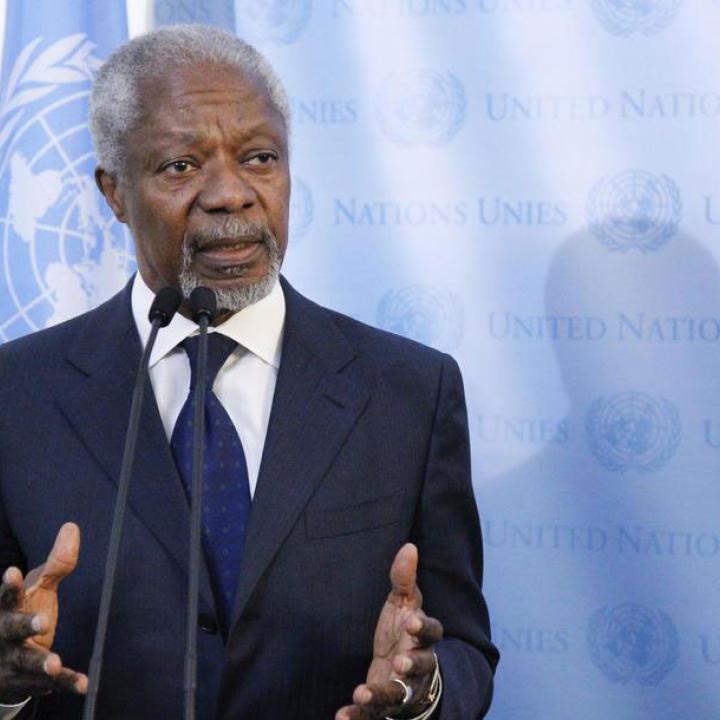

President Bashar al-Assad has agreed to U.N. envoy and former Secretary-General Kofi Annan's six-point plan to end the bloodshed in Syria. Al-Assad was wise to do so. The U.N. initiative, which endorses al-Assad's oversight of a "political process to address the legitimate aspirations" of the Syrian people, is a boon to the dictator and a setback for the opposition.
Al-Assad had little to lose by signing on to the plan. The concessions he made in the deal -- the ceasefire, the ensuring of humanitarian assistance, a release of political prisoners, allowing entry to journalists, and permitting demonstrations -- can all be reversed relatively quickly.
Meanwhile, the benefits for al-Assad are significant. Notwithstanding the fact that the regime has killed nearly 10,000 Syrian citizens, some U.N. member states will likely view the president's acceptance of the plan as a positive step providing evidence of the regime's new willingness to compromise with the opposition. More importantly, Annan's plan says nothing about al-Assad having to leave, much less face trial for crimes against humanity. To wit, when queried on March 27 about whether al-Assad would step down, Annan said "it's up to the Syrian people."
Putting aside the absurd supposition that the Syrian "people" ever had or ever will be empowered to determine al-Assad's future through peaceful means, the plan not only perpetuates, but legitimates al-Assad's continued rule. For the time being, at least, the debate has changed from how al-Assad can be forced from power to what reforms the Syrian strongman can be convinced to make.
At the same time, the plan hurts the opposition. The predictably divergent responses to the news of al-Assad's acceptance from the Syrian National Council, the opposition's government in exile, highlight rifts within the group. Should the negotiations actually occur, questions of who will speak for the opposition will only exacerbate extant divisions. Worse, Annan's plan will slow the momentum building in Washington calling for providing critical funding and lethal assistance to the Free Syrian Army, the military opposition to the regime.
For al-Assad, the Annan plan also provides a useful respite both from international condemnation and for his troops. In particular, a ceasefire would give the regime's 4th Division -- some 12,000 Alawite troops loyal to the minoritarian Alawite regime -- a much-needed break. For the past year, the division has been deployed throughout Syria, tasked with suppressing largely Sunni Muslim rebel forces.
Accepting this U.N. roadmap is vintage al-Assad regime strategy. As usual, he is playing for time. During the Bush Administration, for example, the regime was under a lot of pressure, internationally isolated for its assumed role in the murder of the former Lebanese Prime Minister Rafik Hariri and for helping to move insurgents into Iraq to kill American soldiers.
At moments of maximum international pressure on the regime, however, al-Assad would float the possibility of negotiations with Israel. The mere prospect of Damascus joining the peace camp alleviated the pressure and ended Syria's pariah status. Al-Assad succeeded in waiting out a hostile Bush Administration, which was replaced by an Obama Administration that campaigned on a pledge to diplomatically engage the regime.
If the Annan plan had even a remote chance of succeeding, it might be worth risking the potential downsides. Alas, there is absolutely no prospect of success. Al-Assad had more than ten years to implement political reforms. Judging from al-Assad's recently intercepted emails where he referred to promised reforms as "rubbish laws of parties, elections, and media," the revolt has not spurred an epiphany.
While al-Assad may indeed engage in dialogue with opposition figures, he will not consent to real democratic elections that will lead to majoritarian (i.e., Sunni Muslim) rule in Syria. He may likewise agree to vest parliament with more authority and provide the historically powerless legislature with the appearance of relevance. But this is al-Assad's vision of reform -- it does not reflect the aspirations of the Syrian people who for the past year have put their lives on the line to end the corrupt, tyrannical, and increasingly brutal regime.
What al-Assad will offer during the "political process" will be acceptable to neither the political nor the military opposition. In fact, it's difficult to see anything short of al-Assad's departure from power being accepted.
So Kofi Annan's initiative to end the crisis in Syria is destined for failure. To be sure, al-Assad will blame the plan's failure on the opposition "terrorists" and continue with the atrocities. Meanwhile, the opposition will regroup, and the Free Syria Army, armed by Saudi Arabia and Qatar, will continue the fight to protect demonstrators and end the regime.
At the end of the day, however, the biggest cost of this ill-advised effort may be time. The longer the conflict drags on, the more Islamist the opposition is becoming. Regrettably, counterproductive U.N. efforts like the Annan plan will do little to reverse this trend.
David Schenker is the Aufzien fellow and director of the Program on Arab Politics at The Washington Institute.
CNN Global Public Square



